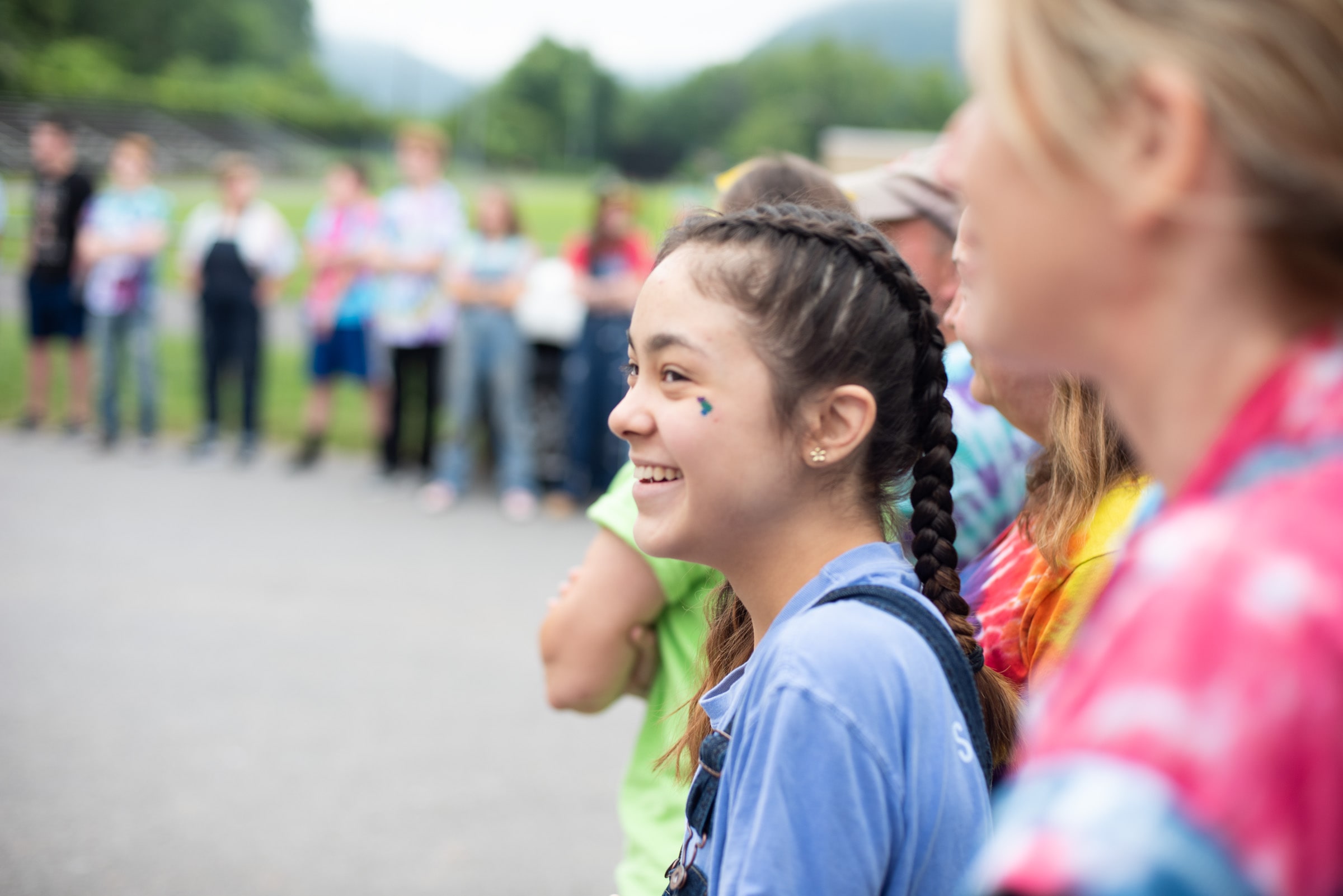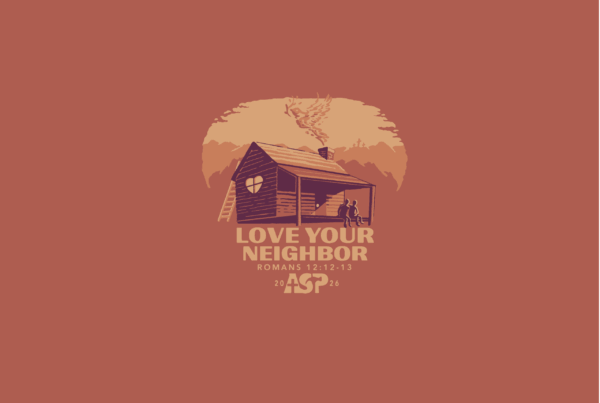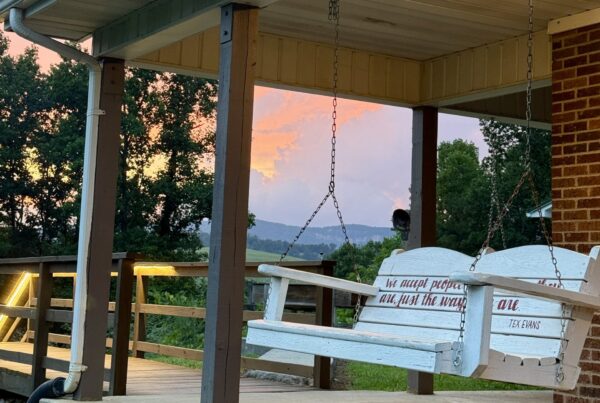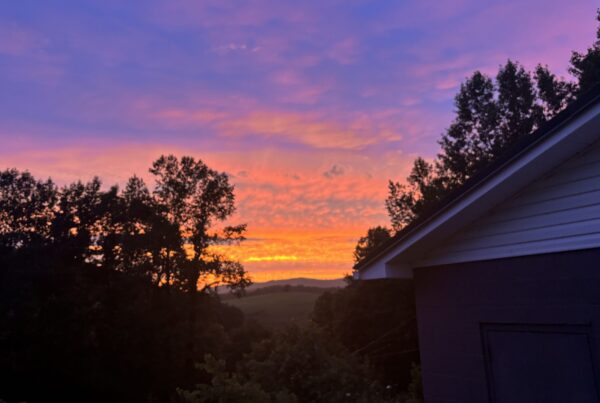Last summer, I spent the Fourth of July in McCreary County, Kentucky. I was traveling with Clara Leonard, ASP’s media guru, and we heard from the McCreary staff that a pastor in town was having a celebratory cook-out at his house. After spending the day between several worksites in Scott County, TN, we drove over the county line and spent the evening in Kentucky.
As we drove into a valley between hills, I saw tables of food lined up beneath a white tent in the pastor’s front yard, a group of people gathered around a cart of potatoes, corn, and shrimp, and lots of kids running around while others sat in folding chairs and watched. It was an incredible night. Everything we ate was either fresh from the grill or spooned out of heartily packed Tupperware containers, and once it got dark, the pastor and his friends set off fireworks. The fireworks illuminated the sky to show how far the mountains went and where the curves dipped into valleys. They illuminated the front yard and showed the joy of parents watching their children, of children watching the explosions of light, and of people being happy to be around other people. In remembering the free-flowing love and sense of connectedness from this night, I realize how much has changed in the past year, how different it might be to plan a community Fourth of July picnic in Kentucky this week.
In the days leading up to the Fourth this year, we are in the midst of two major world events: the COVID pandemic and a surge of protests in response to police brutality and white supremacy. Many of us are also trying to figure out how to stay engaged with Appalachia from a distance, and hopefully we are all working to incorporate conversations about the pandemic and racism into our love of rural, Appalachian towns.
At the start of the pandemic, Appalachia was considered safer than other parts of the country. Unlike big cities, the first known hot spots, the sprawling natural distance of Appalachian life brought a sense of security. An article from the Daily Yonder, which was posted March 4th, says, “health professionals say the reduced person-to-person contact in rural areas will help buffer them from the virus.” Fast forward to present day, and the Daily Yonder’s headlines share a different reality. On June 27th, they posted about how rural areas are now seeing a greater spread of virus cases than anywhere else in the country, and many of the rural communities who have recently felt the effects of the virus are ones with predominately African American populations. While there is an ardent need for home repair in rural Appalachia, current events serve as a reminder of other needs, and have shifted our focus to other ways we can be involved in the region.
Besides keeping in touch with folks I met during my summers on staff, I have found several forms of media to keep me involved with Appalachia while I am away. In the weeks after the end of my first summer, I started listening to the NPR podcast “Inside Appalachia.” The podcast explores the region in a variety of ways, and recently, they have used their episodes to discuss perseverance in the face of COVID and provided space for voices that are not often called upon or recognized in the region. With recent episodes like “Faith and Tradition in a Time of Pandemic,” “Appalachian Strength in the Face of a Pandemic,” “Black Community in Charleston Destroyed for Interstate Not Forgotten,” “7 Stories of Growing up Black in Appalachia,” and “Culture that Connects Appalachia to the World,” the hosts explore how isolated communities are trying to make sense of slowed economies, ineffective or inconvenient healthcare systems, and how to change the stigma that Appalachia is only a home for white, heterosexual people. They also use the podcast to share good things that are happening: many family-owned farms in West Virginia are sharing their produce with neighbors to keep people in their homes and a teacher from Martinsburg, West Virginia took the first line from emails she’s received throughout quarantine and turned them into a poem, which went viral.
If you don’t like podcasts, you can read about how Appalachian communities are adapting to current events. Check out journalistic sites like The Daily Yonder, Scalawag, and Expatalachians. Expatalachians recently posted an article, “In Solidarity,” devoted to news from the protests and resources for ways in which white people can be allies, specifically white people in Appalachia. For narrative-based stories, sites like The Bitter Southerner and 100 Days in Appalachia pride themselves on providing a compilation of stories from diverse voices in the region. If you don’t want to listen to a podcast or read, check out Appalshop’s website. Appalshop, an arts organization in Whitesburg, Kentucky, houses a radio station, a theater, and a record label, among other community-oriented programs. Throughout the pandemic, they have aired radio chats about COVID in Appalachia, shown documentaries on Facebook, and been intentional about making space for overlooked voices. Recently, they announced their newest project: a fund for creatives in central Appalachia. With a call for creatives who are BIPOC, LGBTQ+, and/or people who have had first-hand experience with COVID, they offer an example of how actions can follow conversation.
I assume everyone reading this blog post cares about Appalachia. While most of us are probably used to exerting our care through the physical labor of volunteer home repair, we can also embody love and faith through educating ourselves on how Appalachia is changing alongside our home communities and the rest of the world. The links throughout this post provide a few resources for staying engaged with Appalachia, but there are more, and I encourage you to share other resources as you find them.
As an ASP family, we are united in our desire to eradicate substandard housing in central Appalachia, but we are also united in a desire for all people to have affordable, accessible healthcare, for people of all races and gender identities to be seen, heard, and loved. Tex Evans stated the importance of accepting people right where they are, just the way they are, and right now, at the conjunction of social, economic, and medical turmoil, we have the ability to use education and conversation to turn his words into action.
Jamie Tews, former ASP volunteer, summer staff, and story gathering intern
